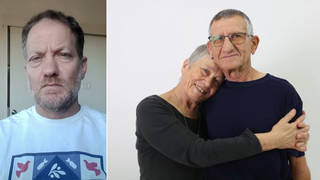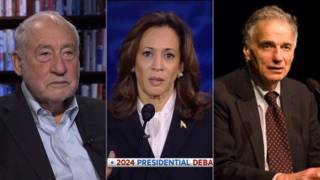
After two deadly crashes, the Senate holds its first hearing on how the Federal Aviation Administration lets the airline industry regulate itself. This comes as the Senate Committee on Energy and Natural Resources will hold confirmation hearings today on Trump’s nominee to head the Interior Department, David Bernhardt, a former oil lobbyist. Meanwhile, a federal jury in California has just ordered Monsanto to pay over $80 million to a cancer survivor whose illness was found to have been partly caused by the herbicide Roundup. “When we see these regulatory issues, they’re often abstract, and people maybe don’t pay attention to them,” says Robert Weissman, president of Public Citizen. “What they fail to realize is that, actually, failed regulation means people are going to die.”
Transcript
AMY GOODMAN: This is Democracy Now! I’m Amy Goodman, with Nermeen Shaikh.
NERMEEN SHAIKH: We turn now to look at how regulatory agencies under the Trump administration have been captured by corporations. On Wednesday, the Senate’s Aviation Subcommittee held a hearing on the two deadly crashes of Boeing’s new 737 MAX jets, where the Federal Aviation Administration defended the agency’s reliance on aircraft makers to help certify their own planes for flight. The delegation process is known as the ODA program. This is FAA acting head Daniel Elwell.
DANIEL ELWELL: We have very strict oversight on every participant in an ODA program. And we make sure that they are experts in the field, that they have the appropriate understanding of FAA regs and manuals, they have—professional integrity is checked. Everything. But to your point, if we had no ODA at all, it would—an estimation, it would require roughly 10,000 more employees to do that role at the FAA and about $1.8 billion for our certification office in the FAA.
NERMEEN SHAIKH: Boeing has spent more than $70 million on lobbying since 2015. It also contributed to the campaigns of members of the committees that regulate it, including more than $60,000 to the 2018 re-election campaign of Republican Senator Ted Cruz, who is chairman of the Aviation Subcommittee.
AMY GOODMAN: This comes as the Senate Committee on Energy and Natural Resources is holding confirmation hearings today on Trump’s nominee to head the Interior Department, David Bernhardt, a former oil lobbyist. Meanwhile, a federal jury in California has just ordered Monsanto to pay over $80 million to a cancer survivor whose illness was found to have been partly caused by the herbicide Roundup.
For more on these corporate issues, we’re joined by Rob Weissman, president of Public Citizen. On Wednesday, the group delivered a poster-sized version of Bernhardt’s conflict-of-interest cheat sheet to lawmakers, who will vote on his confirmation and received nearly $1 million in donations from Bernhardt and his former lobbying firm. But we’re going to get to that in a minute. We want to start with Boeing.
Talk about the significance of this hearing. The deaths of 346 people in two airline crashes in the last months, from Indonesia to Ethiopia, Boeing’s plane found seriously at fault, yet the U.S. was the last to ground the MAX 7 and 8 planes. What did you learn yesterday?
ROBERT WEISSMAN: Well, we’re seeing more and more evidence of how the FAA, the agency that’s supposed to regulate Boeing, is in fact working for Boeing. It’s staffed, actually, by Boeing, and it’s outsourced its regulatory duties to Boeing. In the clip you played at the top of the show, you have the acting administrator saying, “I don’t understand”—he calls them “safety companies,” the airlines—he calls them, the airplane manufacturers, “safety companies”—”I don’t understand how they might cut back on safety.” It’s a pretty big problem when the guy who’s in charge of regulating safety can’t understand how the manufacturer might cut back on safety. And, of course, he comes from the industry. The person who runs the safety division at the FAA did a stint for the lobby association for the aerospace companies. The new guy coming in to replace the acting administrator comes from the airlines. So, you—
AMY GOODMAN: Delta.
ROBERT WEISSMAN: From Delta. So, you have this total revolving-door problem and a total capture of the agency, maybe as bad as anywhere in government.
NERMEEN SHAIKH: So, talk about who Stephen Dickson is, Steve Dickson, the former Delta executive who Trump has picked to head the FAA.
ROBERT WEISSMAN: Yeah, well, it’s exactly part of the same story. So, you have different parts of the industry running the FAA. So the results are predictable: They’re not going to do their job. And, in fact, it’s not even clear they understand their job to really do safety and regulate the companies that they’re overseeing. They seem to think that their job is to work in collaboration with the companies to do the best they can, and actually to promote the industry.
AMY GOODMAN: So, was Boeing responsible for the deaths of 346 people? How? And what exactly didn’t the U.S. regulatory agencies do to prevent this from happening? What was their role?
ROBERT WEISSMAN: Right. We’re still going to have to learn more. But what seems to be unfolding is that they redesigned the 737. The design required some new kind of software, autopilot software. The autopilot software made errors. The pilots, the human pilots, weren’t able to overcome, in many cases, the errors inflicted by the computer software, and the planes crashed. Blumenthal said—Senator Blumenthal said yesterday at the hearing that he’s read reports from many pilots in the United States who had had exactly the same problem but were able to overcome, unlike the pilots in Ethiopia and in Indonesia. So, we’re pretty lucky, maybe, that it’s only been two flights.
NERMEEN SHAIKH: How long had this been in use, the 737 MAX?
ROBERT WEISSMAN: This is relatively new. They’ve rushed it to the market. So this is still new technology. And it’s exactly the case of why you want an independent regulator. They rushed it. They had competition from Airbus. They were under pressure to get it to market quickly, and so they did. And it appears they did so cutting corners on safety.
AMY GOODMAN: You are the president and CEO of Public Citizen, which was founded by Ralph Nader. Ralph’s grandniece—
ROBERT WEISSMAN: Yeah.
AMY GOODMAN: —Samya Stumo, died in the Ethiopia crash. She was one of 346 people in those two crashes. Right now what do you feel has to happen with the FAA? And Dickson is not a done deal, right? He has to be approved by the Senate.
ROBERT WEISSMAN: That’s right. He’ll have to be confirmed. You know, I’m going to say, I knew Samya, Ralph’s grandniece, and she was delightful. When we see these regulatory issues, they’re often abstract, and people maybe don’t pay attention to them. What they fail to realize is that, actually, failed regulation means people are going to die. And when you know the person who died, it changes the whole story for you. It personalizes it and makes it real. And so it’s totally heartbreaking.
At the FAA, they have outsourced so much of their regulatory oversight to Boeing. There’s a real problem about how they can actually do their public duty again. You heard Elwell say, “Gosh, we would need 10,000 new inspectors.” I don’t know if they would need 10,000 new inspectors, but they will need more. They don’t have the capacity in the agency. So it’s going to take some time to rebuild this agency.
AMY GOODMAN: Let’s move on to Bernhardt. Let’s move on to the hearing that’s taking place today, the interior secretary, and why you’ve written this open letter.
ROBERT WEISSMAN: Well, out of all the Trump appointees, this guy may be the most conflicted one coming in. It’s hard to say, but he’s in the running for the most conflicted Cabinet appointee. He carries around a card listing all of his conflicts of interest and all the companies he’s not supposed to work for, because he can’t keep track of it. It’s more than two dozen. On the other hand, it’s not really clear why he carries the card around, because he doesn’t seem to use it. He is, in fact, working on behalf of the companies that he used to represent, intervening in a lot of decisions at the Department of Interior so far as the number two to help companies that he used to work for.
NERMEEN SHAIKH: And why do you think Trump chose him to replace Zinke?
ROBERT WEISSMAN: Well, you know, the MO at the Trump administration seems to be, if you’ve got an ethics crisis because someone’s forced out, why don’t we replace them with an insider corporate lobbyist? That’s our solution to the ethics problem. This guy was their number two. He does know the agency. He’s very effective. He’s very effective working for the companies that he used to represent. And so he was a natural choice for the Trump administration.
NERMEEN SHAIKH: And the Department of Interior is actually looking at a proposal expanding offshore oil drilling, which has happened while he’s been there?
ROBERT WEISSMAN: Right. So, he is involved in efforts on offshore drilling. He used to work for the oil and gas industry. He’s involved in changes to the Endangered Species Act on behalf of clients he used to work for. He’s now intervened in pesticide decisions that would affect the former Dow company, who made a million-dollar contribution to the Trump administration and is close with the administration.
AMY GOODMAN: Is it true Bernhardt ordered some furloughed workers back to work during the government shutdown to push through oil and natural gas drilling permits, offshore drilling permits in the Alaska refuge?
ROBERT WEISSMAN: I don’t know if Bernhardt was the one who ordered it, but that’s definitely occurred, yes.
AMY GOODMAN: So, what are you demanding right now?
ROBERT WEISSMAN: Well, our position is this is not a guy who’s qualified to run Department of Interior. He shouldn’t be approved.
AMY GOODMAN: What about pesticides?
ROBERT WEISSMAN: Well, he’s intervened recently, The New York Times just reported, in two instances of pesticides, highly toxic pesticides. Biggest study inside the Department of Interior found that the use of these pesticides would jeopardize more than a thousand endangered species. So, the conclusion is, OK, we’ve got to deal with this problem. He’s not a guy who knows pesticides, but he intervened. He came, and he sort of swooped into this process and said, “OK, never mind. We’re not doing that. We’re not going to take any regulatory action. Business as usual.”
AMY GOODMAN: So, his move benefited major pesticide makers, including FMC Corporation and Dow AgroSciences—Dow a major donor to President Trump. I think they gave like a million dollars to his inaugural committee.
ROBERT WEISSMAN: That’s exactly right.
AMY GOODMAN: Finally, the latest court decision that just came down around Monsanto and Roundup, its pesticide?
ROBERT WEISSMAN: So, a huge decision in a case brought by a man who has cancer, still living with cancer, alleging that it was caused by Roundup. And the jury came in and said, “Yes, it caused it,” and gave huge damage, not just for the disease that he’s been inflicted with, but as a punitive damage to punish Monsanto, now owned by Bayer, for what the jury believed was covering up of the evidence of the carcinogenicity of Roundup for many, many years.
AMY GOODMAN: Will this award happen?
ROBERT WEISSMAN: Well, you don’t know. I mean, Bayer is going to certainly—Bayer-Monsanto will certainly appeal this decision. But in this case, it was designated by the judge as a bellwether case because there are so many cases in line. And the judge is saying, “Look, we want to see how the first few trials go, and then we’re going to make a decision about how we should look at the rest of these cases.” It’s going to really strengthen the hand of the other people who have claims to negotiate a fair settlement from Bayer-Monsanto.
AMY GOODMAN: Rob Weissman, we want to thank you very much for being with us. Robert Weissman is president of Public Citizen.
This is Democracy Now! When we come back, Biased: Uncovering the Hidden Prejudice That Shapes What We See, Think, and Do. Stay with us.












Media Options